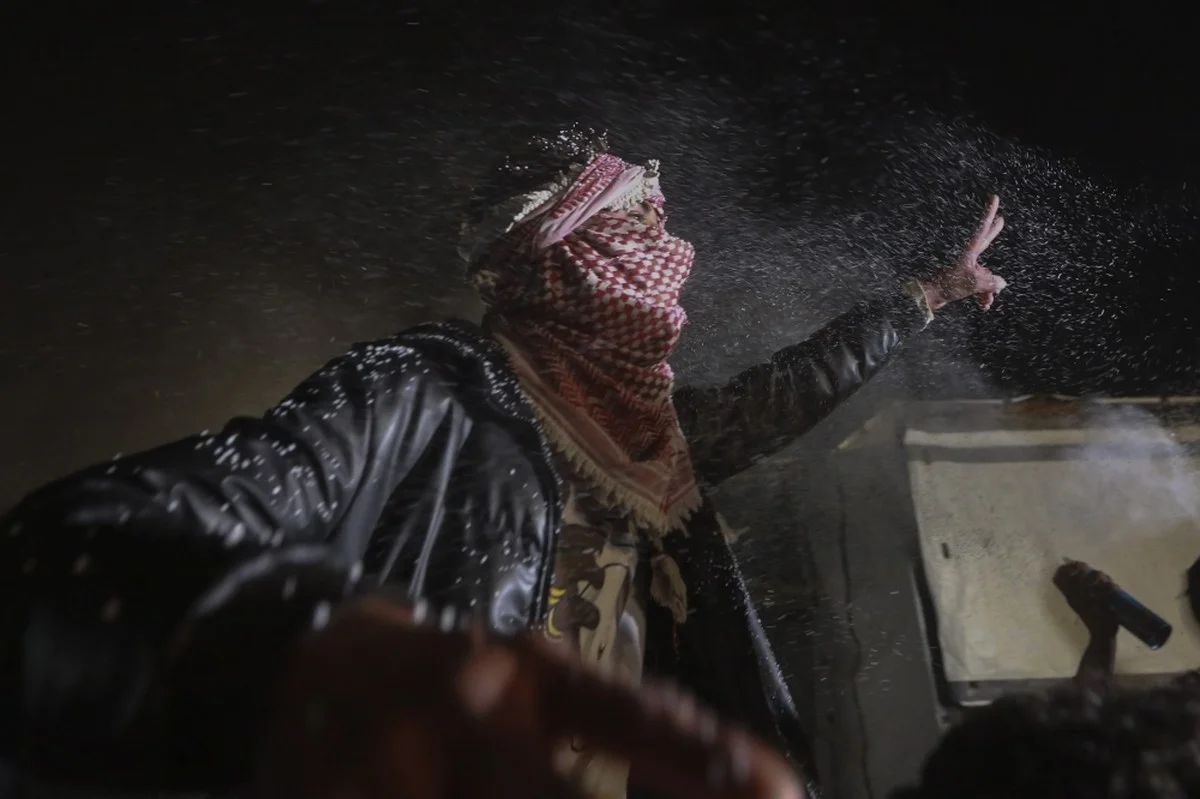16/01/2025
16/01/2025

JERUSALEM, Jan 16, (AP): Israeli Prime Minister Benjamin Netanyahu said early on Thursday that Hamas has backtracked on an earlier understanding of the ceasefire agreement.
His statement could indicate that obstacles remain to implementing the deal. Under the three-phased deal, Hamas would release dozens of hostages in exchange for Israel releasing hundreds of Palestinian prisoners.
It would also allow hundreds of thousands of people displaced in Gaza to return to what remains of their homes. Netanyahu said that Hamas was objecting to a part of the agreement that gave Israel the ability to veto the release of certain Palestinian prisoners.
Hamas was trying to dictate which Palestinian prisoners would be released, Netanyahu said. He said he told Israeli negotiators to stand firm on the earlier agreement. Hamas did not immediately respond to Netanyahu’s statement.
The statement came soon after President Joe Biden wrapped up a final farewell address to the nation after earlier touting the role of American diplomacy in negotiating the ceasefire.
Meanwhile, Egyptian, Qatar, and U.S. negotiators will head to Cairo today for further talks on implementing all aspects of the ceasefire deal, according to a senior U.S. official. The official said the negotiators are focused on making sure expectations are clear to both Israel and Hamas, and that implementation of the agreement is carried out as smoothly as possible. The official was not authorized to comment publicly and spoke on the condition of anonymity.
Earlier on Wednesday mediators announced that Israel and Hamas have agreed to pause the devastating war in the Gaza Strip, raising the possibility of winding down the deadliest and most destructive fighting between the bitter enemies.
The three-phase ceasefire deal promises the release of dozens of hostages held by militants in Gaza and hundreds of Palestinian prisoners in Israel, and it will allow hundreds of thousands of people displaced in Gaza to return to what remains of their homes.
It would also flood desperately needed humanitarian aid into the territory ravaged by 15 months of war, mediators say. The prime minister of Qatar, Sheikh Mohammed bin Abdulrahman Al Thani, said the ceasefire would go into effect on Sunday and that its success would depend on Israel and Hamas "acting in good faith in order to ensure that this agreement does not collapse.”
He spoke in the Qatari capital of Doha, the site of weeks of painstaking negotiations. U.S. President Joe Biden touted the deal from Washington, saying the ceasefire will stay in place as long as Israel and Hamas remain at the negotiating table over a long-term truce.
Biden credited months of "dogged and painstaking American diplomacy” for landing the deal, noting that his administration and President-elect Donald Trump’s team had been "speaking as one” in the latest negotiations. Israeli Prime Minister Benjamin Netanyahu said late Wednesday that the ceasefire agreement with Hamas is still not complete and final details are being worked out.
An Israeli official familiar with the talks who spoke on condition of anonymity said those details center on confirming the list of Palestinian prisoners to be freed.
Any agreement must be approved by Netanyahu’s Cabinet. Netanyahu thanked Trump and Biden for "advancing” the ceasefire agreement, but did not explicitly say whether he has accepted it, saying he would issue a formal response only "after the final details of the agreement, which are currently being worked on, are completed.” His measured reaction may reflect domestic politics.
Netanyahu's governing coalition depends on the support of two hard-line factions whose leaders have threatened to leave the government over the planned release of Palestinian prisoners. Although opposition leaders have vowed to support the ceasefire deal, the loss of his hard-line allies could lead to the collapse of the coalition and trigger early elections.
Israeli President Isaac Herzog called on Netanyahu’s government to approve the ceasefire in a nationally televised speech. Hamas said in a statement that the ceasefire was "the result of the legendary resilience of our great Palestinian people and our valiant resistance in the Gaza Strip.”
Mediators from Egypt, Qatar and the U.S. will meet in Cairo on Thursday for talks on implementing the deal, according to a senior U.S. official who was not authorized to comment publicly and spoke on the condition of anonymity.
Once the first phase of the deal takes effect, it is expected to deliver an initial six-week halt to fighting along with the opening of negotiations on ending the war altogether. Over those six weeks, 33 of the nearly 100 hostages are to be reunited with their loved ones after months in captivity with no contact with the outside world, though it’s unclear if all are alive.
It remained unclear exactly when and how many displaced Palestinians would be able to return to their homes, and whether the agreement would lead to a complete end to the war and the full withdrawal of Israeli troops from Gaza - key Hamas demands for releasing the remaining captives.
Many longer-term questions about postwar Gaza remain, including who will rule the territory or oversee the daunting task of reconstruction after a brutal conflict that has destabilized the broader Middle East and sparked worldwide protests. Hamas triggered the war with its Oct. 7, 2023, cross-border attack, which killed some 1,200 in Israel and took 250 others hostage. Israel responded with a fierce offensive that has killed over 46,000 Palestinians, according to local health officials, who do not distinguish between civilians and militants but say women and children make up more than half of those killed.
More than 100 hostages were freed from Gaza in a weeklong truce in November 2023. The U.S., along with Egypt and Qatar, have brokered months of indirect talks between the bitter enemies that finally culminated in this latest deal. It comes after Israel and the Lebanese militant group Hezbollah agreed to a ceasefire in November, after more than a year of conflict linked to the war in Gaza. U.N. and international relief organizations estimate that some 90% of Gaza’s 2.3 million people have been displaced, often multiple times.
They say tens of thousands of homes have been destroyed and hospitals are barely functioning. Experts have warned that famine may be underway in northern Gaza. Abed Radwan, a Palestinian father of three, called the ceasefire deal "the best day in my life and the life of the Gaza people. ... Thank God. Thank God.” Radwan, who has been displaced from the town of Beit Lahiya for over a year and shelters in Gaza City, said he hopes to return and to rebuild his home.
As he spoke to AP by phone, his voice was overshadowed by the celebrations of fellow Gazans. "People are crying here. They don’t believe it’s true," he said.
In Israel, hundreds of demonstrators gathered outside Israel’s military headquarters in Tel Aviv, calling for a deal to be completed. Many held posters of hostages held by Hamas, others hoisted candles in the air. As the deal was announced, some people were unaware that it had gone through. Sharone Lifschitz, whose father Oded is being held in Gaza, told the AP by phone she was stunned and grateful but won’t believe it until she sees all the hostages come home.
"I’m so desperate to see them, if by some miracle my father has survived,” she said. The Hostage Families Forum, which has long pressed Israeli leaders to make a deal that would bring the captives home, said it welcomed Wednesday's announcement with joy and relief. "After 460 days of our family members being held in Hamas tunnels, we are closer than ever to reuniting with our loved ones,” the group said in a statement.
Biden, who has provided crucial military aid to Israel but expressed exasperation over civilian deaths in Gaza, announced the outline of the three-phase ceasefire agreement on May 31. The agreement eventually agreed to followed that framework.
He said the first phase would last for six weeks and include a "full and complete ceasefire,” a withdrawal of Israeli forces from densely populated areas of Gaza and the release of a number of hostages, including women, older adults and wounded people, in exchange for the release of hundreds of Palestinian prisoners.
Humanitarian assistance would surge, with hundreds of trucks entering Gaza each day. The second and most difficult phase would include the release of all remaining living hostages, including male soldiers, and Israeli forces would withdraw from Gaza.
The third phase calls for the start of major reconstruction of Gaza, which faces decades of rebuilding from devastation caused by the war. Hamas had been demanding assurances of a permanent end to the war and complete withdrawal of all Israeli forces from Gaza. Israel, meanwhile, has repeatedly said it would not halt the war until it destroys Hamas’ military and governing capabilities.


